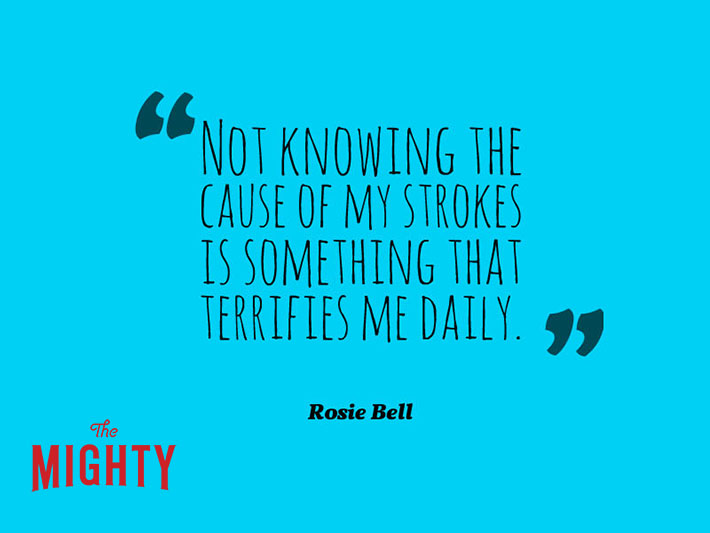A stroke happens when the blood supply to the brain is interrupted. Everyone who has a stroke is affected differently, and some may experience problems on a certain side of their body (for example, a stroke on the right side of the brain can impact the left side of the body). Others may have difficulty eating, breathing and moving if they experience a stroke at the base of the brain.
And even though the World Stroke Organization reports that 1 in 6 people will have a stroke in their lifetime, the average person knows little about what happens before, during and after a stroke. So the Mighty teamed up with the National Stroke Foundation of Australia and asked stroke survivors what they wish others understood about their experiences.
Here’s what they had to say:
1. “Not knowing the cause of my strokes is something that terrifies me daily. I don’t know if I will have another and if I’ll be alone with my daughter again if I do.” — Rosie Bell
2. “Your life changes. Your previous life is no longer, and you are now on a different path.” —Karen Kelsey
3. “Some days are better than others. Some days it’s hard to be strong.” —Adam Colbourne
4. “I’d tell people to get your blood pressure checked! Ironically, my mum had a massive pontine stroke on World Stroke Day seven years ago and died 10 days later. I’ve only just turned 40 and have hypertension too; I am on anti-hypertensive medication as a result. I learned from experience. It can happen to anyone! My mum didn’t smoke or drink and she walked every day.”
—Cecelia Cooke
5. “Every day is a struggle mentally and physically… Although it gets better over time, it’s a lifelong rehab!” –Ida Dempsey
6. “[There’s a] need for rehabilitation after [the] hospital discharge.” —Tracey Roberts
7. “Side effects of stroke [can be] invisible.” —Astrid Pianto
8. “I’m still fighting to get the word ‘aphasia‘* known in the wider community and it’s hard.” —Wendy Corp
9. “Healthy people have strokes. I never smoked or drank alcohol. I played weekly sports until 83 years of age.” —Narelle Huett (on behalf of her father)
10. “After nearly four years… [it] still takes a lot longer to do things.” —Jen Jay
11. “Strokes do not discriminate. Any age/gender/nationality/fitness. It can happen to anyone.” —Linda Steuer
12. “Living alone after stroke is more lonely than loneliness.” — El JustEl
13. “Never give up hope! I was told I would never walk again. My left side was paralyzed, now look at me!” —Ariadne
@TheMightySite Never Give up Hope! I was told I would NEVER walk again. My left side was paralyzed, now look at me! pic.twitter.com/ASUkY1UXJ9
— Ariadne (@MightyMitoZebra) October 28, 2015
*Aphasia (or dysphasia) is a communication problem that may affect many stroke survivors. This can make it difficult for people to “find the right words, use long sentences or understand what others are saying.”




